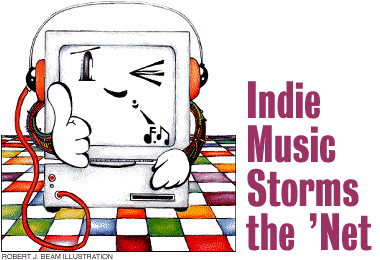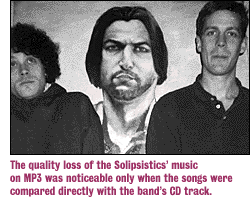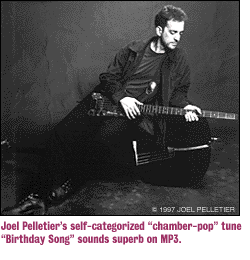From New Haven Advocate, online edition, 12 February 1999
Will record companies go the way of the 8-track?By Hank HoffmanSo you wanna be a rock & roll star? Well, beware. The music business is legendary for the casualties it has left in its wake -- careers ruined, money never paid, art compromised. But the times they are a-changin'. For the first time, musicians the world over are able to bypass the middlemen -- the record companies that have controlled music and made musicians' lives miserable for most of the century. Digital music distribution through the Internet may spell liberation from the recording industry plantation for musicians and fans alike. The catalyst for this upheaval is a digital music format called MP3, short for MPEG Layer 3. An audio coding format, MP3s can achieve near-CD quality sound at 1/12th the file size: Where an average song could gobble almost 40 MB of computer hard disk space, an MP3 will take about 3.5 MB. By enabling Web surfers to download a song in about 10 minutes, MP3 has made the wide-scale distribution of high-quality digital music a reality. The boom in MP3s has sent a shiver of fear through the mainstream recording industry. Proliferating sites offer downloads of free music. According to the Recording Industry Association of America, or RIAA, a "significant majority" are giving away illegal pirated music. The record companies recently announced the launching of the Secure Digital Music Initiative, an attempt to agree on a format that will use encryption to prevent copying of Internet-distributed songs. The association has also gone to court -- so far, unsuccessfully -- to prevent the sale of Diamond Multimedia's Rio, the first portable MP3 player, charging that the device encourages piracy. The Rio, which is about the size of a deck of cards and has no moving parts (great for jogging!), plugs into a PC to load up with songs. It costs under $200. But more interesting to independent-minded music fans are the implications of sites like www.mp3.com, which allow independent musicians to offer their songs to the world. Here is the potential for a revolution in the distribution of music. Instead of depending on an increasingly concentrated record industry -- a recent merger reduced the number of major labels to five and led to the dropping of numerous acts from company rosters -- Internet presence will allow musicians to reach the public directly in a way not previously possible. Perhaps that's what really has RIAA shaking in its boots. Formerly, the route to success -- or the possibility, rather than the guarantee, of success -- was to hitch one's wagon to a major label and hope they made you a star. But these partnerships are more like cutting a deal with the devil. Artists sign exclusive contracts with labels, give up control over their master tapes and the copyrights to their own songs and see large advances dissolve as the company charges them for recording and other costs. And, chasing the big hit, musicians often compromise their artistic vision under pressure from their label. And if the label doesn't keep its commitments? Tough luck. Musicians have lost years of their careers trying to extricate themselves from bad contracts. Not to mention the money lost in epic battles over unpaid royalties. MP3.com, and the Internet in general, offer another way. The site gives free promotion and disk space to any artists who want to join. The artists retain the copyrights, link to their own Web sites and can offer their work elsewhere at the same time and terminate the relationship whenever they want. They can get daily updates on the number of visits to their page and the number of song downloads. Through MP3.com's Digital Automatic Music (DAM) program, artists can sell CDs with both CD and MP3 tracks and split the proceeds 50/50. If this direct marketing of discs over the Web takes off, musicians would greatly benefit. Most record labels pay the artist only a buck or two per disc sold. I spent a couple of recent evenings searching the MP3.com site and downloading songs. Each MP3.com band is asked to name some of its musical influences and to what popular artists it would compare its own sound.By plugging names like Velvet Underground, Pavement, My Bloody Valentine, Matthew Sweet, Wilco, Tricky and others into the MP3.com search engine, I found a few dozen songs that sounded interesting. (That's just a start: The site, according to president and founder Michael Robertson, has 15,000 songs by 4,000 artists in 37 different genres. My searches carried me primarily into the Alternative, Pop, Rock and Punk categories but there are also Electronica, Hip Hop, Country, Jazz and many others.) What did I come up with? The Solipsistics, Ace-Tones, Debris, Sutrobath, El Enaño, Hypoxia Beach, Joel Pelletier, Sawyer, Martian Lamps, Make Lisa Rich, Loomer, Bunny Plasm, Insect Trust, Stunt Monkey, the Visitors, the SpaceInvader, Earle Mankey, Real Crazy Apartment, Shiver U.K., A Band Called Horse, Rocket City Riot, Zava, Los Mox, the Gravity, A Modern Joy, Junkie, Idle Kings. Never heard of most (my colleague Christopher Arnott has sung the praises of the Solipsistics in these pages previously) or any of them? That's the point. Was it any good? Yes, but not uniformly. Shiver U.K.'s "Spacegirl," a catchy little ditty, is marred by exceedingly poor sound. In fact, sound quality tends to be variable. That seems more a function of the original recordings -- were they recorded in a bedroom or a studio? -- than of the MP3 format, however. Joel Pelletier's self-categorized "chamber-pop" tune "Birthday Song" sounds superb. Layering acoustic guitar with well-scored and well-produced strings, topping it off with a George Harrison-style lead and a direct quote from the Beatles' "The End," Pelletier creates a touching pop song about aging. The Solipsistics -- essentially Jeffrey Ewan McGregor and friends -- descend from the John Cale side of Velvet Underground lineage with flourishes of wry wit and Tin Pan Alley thrown in. Having access to their two CDs, the only MP3.com band for which that was the case, I was able to do side-by-side comparisons. The MP3s sounded fine by themselves but the quality loss was noticeable when they were played right after the comparable CD track.
"Old" by Sutrobath builds to a McCartneyesque crescendo of repeated chords overlaid by a simple, stinging guitar figure and ending in a Magical Mystery Tour-era dissolve. An accretion of guitar noise a la Pavement fuels Hypoxia Beach's "At the Bottom" while wah-wah guitar twangs like a jew's harp. In Sawyer's "The Counties," Scottish post-punk that sounds like the Fall, the singer declaims over a guitar barrage. A search under the name "Wilco" turned up the melodic roots-rock song "Hiding In Your Heart" by A Band Called Horse, from Canada. A "Velvet Underground" search yielded El Enaño, Argentine punk rockers. New Zealanders Debris' "Guilty Conscience" is dark alt-rock powered by sustained fuzzy chords laced with ululating backwards guitar notes. This geographical dispersion is one of the most important MP3 breakthroughs. Natalie Biz, manager of Debris, says via e-mail that "the growth of MP3 has been of great benefit to bands from countries like New Zealand, where artists are basically as isolated as it is possible to be from the rest of the world." Biz says "rarely a day goes by" in which the band doesn't get a few e-mails from "around the planet" praising its music. Debris has attracted interest from radio stations in Italy, Brazil, Siberia and South Korea. Biz acknowledges that purchases of Debris' product have not risen commensurate with the success in getting heard -- every artist who responded to my e-mail inquiries said the same thing -- but she hopes that will change. She thinks the Web will allow musicians to buck the trends that have been foisted on them in the past. "For a New Zealand band to have achieved this five years ago would have required a major distribution deal, and the only bands that got those were the ones that already sounded like what was getting thrown at us from the US and UK," declares Biz. Bands will "now have a viable alternative to major label distribution to get themselves heard, and artists will be freer to do exactly what it is they want to do, as they won't be tied down into thinking 'what is it that will be acceptable to the label?'" The impact of MP3s is dramatic, says Michael Robertson, the president of MP3.com. "It cuts to the quick of the music business by transforming an industry that thrives off super-mega-stars to an industry where even the small guy can make it," declares Robertson. "We've turned the model upside down. We put the artists in control; that means the artist can leave at any time," says Robertson. "It's not like getting the artist drunk, waving 100s in their face and getting them to sign a three-year deal. In fact, it's quite the opposite. They're coming to our site voluntarily." MP3.com is 14 months old and started selling CDs only about four months ago. Robertson says they're selling about 50 to 100 daily. Asked about the company's profitability, Robertson says, "It's a little early to measure this company by if it's profitable yet." But MP3.com attracted attention in mid-January when it was announced that venture capital firm Sequoia Capital, which has previously backed Yahoo, Oracle and Apple, was lead financier in an $11 million infusion. "They wouldn't bet on us if we didn't have a really solid business model," Robertson says. The Internet is a boon for adventurous consumers as well as artists, says Robertson. "Now you're only likely to hear the most mainstream of artists, because those are the ones with the potential to sell millions of CDs. The Internet really swings the doors open to content," argues Robertson. "Thousands of artists, tons of different music genres that you have no other way of being exposed to." In contrast to the record labels with their armies of A&R (artists and repertoire) scouts deciding who will and won't get signed, MP3.com rejects the role of gatekeeper. "We have the biggest A&R staff in the world -- it's called the Internet," says Robertson. "We haven't said, 'Michael has good ears; he can pick music everyone likes.' We let the Internet determine which are the good artists: We measure what CDs are being purchased, what songs are downloaded, what Web pages are being visited." MP3.com does not encrypt its files with copy protection. Robertson argues that fears of piracy are overplayed and that such encryption hurts more than it helps. The inability to copy songs -- to different formats, from one machine to another -- makes the product less attractive to the consumer. "A security-based solution is putting the focus on the wrong area. The focus should be on how you maximize revenue from content," says Robertson. "The way you do that is not to lock it up in a vault. The way you do that is to get as wide exposure for your product as you can."
But security is very much the issue for the RIAA. On Dec. 15, the association announced the formation of the Secure Digital Music initiative, an industry-wide attempt to develop a single format for Internet distribution of music that will protect copyrights. "It's a common misperception that the RIAA and the recording industry in general is anti-MP3," says Steven Marks, RIAA vice president and deputy general counsel. "We're just anti-illicit files, whatever format they may be in." According to Marks, "more than a majority of MP3 files on the Internet are illicit." That's why, he says, the association sued to prevent the sale of the Rio portable MP3 player. The device violated the 1992 Audio Home Recording Act, Marks says, because it "did not prevent serial copying. It [is] essentially profiting off a market of illegal files" and "threatens the development of legitimate markets," Marks says. "Why would anybody pay for something if they can get it for free?" Diamond Multimedia attorney Andrew Bridges charges that "the RIAA's real goal is stopping the legitimate MP3 market." "Can you do something illegal with the Rio? Yes, and you can also do it with the mini-disc player, computer or cassette player, and you can bootleg CDs. That doesn't mean a Discman is illegal," responds Diamond vice president for corporate marketing Ken Wirt. "Rio doesn't have anything to do with facilitating [piracy] any more than a Discman encourages people to bootleg CDs. It's a player. It doesn't make illegal recordings." The Rio remains on the market while the suit -- and Diamond's countersuit against the RIAA for restraint of trade -- remains in litigation. Critics of the recording industry say its obsession with security has kept it from developing a legitimate online presence, creating a vacuum in which piracy can thrive. "Companies are developing ways to deliver music," Marks responds. "But they want to make sure it's secure." Marks doesn't think digital distribution threatens the traditional prerogatives of the recording companies. Ironically, it's precisely the gatekeeper aspects of the business that Marks cites for his optimism. "Certainly, [digital distribution] may make it easier for a garage band to post their music on the Web," says Marks. "But there's a lot of music out there. One thing the record companies try to do is to find the most talented artists and songwriters, so they perform functions that will continue to be very valuable in the future."
New Haven Advocate home page
|
The Magic Of MP3sAlmost everything you need to get started in the MP3 world is available in either freeware or shareware versions online. (Shareware software can be downloaded and tried out. If you like it, there's usually a small cost to register it.) Just as you need a CD player to play a CD, you need an MP3 player to play MP3s on your computer. There are a growing number of players available, including WinAmp and MusicMatch for Windows users and MacAmp and SoundApp for Macintosh partisans. If you want to create your own MP3s from CDs -- or create CDs from downloaded MP3s -- you need software that translates from one format to the other. Getting CD tracks into the computer is done with a "CD ripper," which literally strips selected tracks from your disc and stores them on your hard drive as a WAV (Windows) or AIFF (Macintosh) file. To convert the ripped sound files -- which are disk spacehogs, weighing in at an average 40 megabytes -- to MP3s, use an encoder. Make sure to read the documentation that comes with the encoder to get the best possible sound: Encoding is often the weak link in preserving sound quality in the transition from CD to MP3. If you have a CD burner, use a decoder to convert those MP3s to WAV or AIFF files and burn them to CD as you would any other songs. And it doesn't hurt to have a fast Internet connection. When I first started downloading MP3s, I was still using my 14.4k modem -- that's 30 minutes per three-minute song. MP3s convinced me to trade in my horse-and-buggy for a race car: 56k and zoooom!
MP3s CompanyHere are a few Web destinations to get you started:
Sound BytesAre MP3s "CD quality," as some sites claim? Michael Robertson, president of MP3.com, acknowledges that if "you do a side-by-side listening test, you can probably pick" which is the CD version and which is the MP3. But Robertson says the format has "met some sort of magical quality threshhold" with the public. "You can't precisely determine it, but clearly it's there. Why? People told us because they brag about how big their MP3 collection is. They don't brag about how big their RealAudio collection is," says Robertson. I tried my own test. Using Toast Audio Extractor, a commercial Macintosh CD ripper, I took four songs off a CD released by my own rock group. Using MPecker Encoder, a freeware Mac program available through many MP3 sites, I converted the CD-size files (about 40 MB) to MP3s (less than 4 MB). Listening through the computer speakers, I switched back and forth between the MP3 and CD version of each song. I couldn't tell the difference. -- H.H. |



